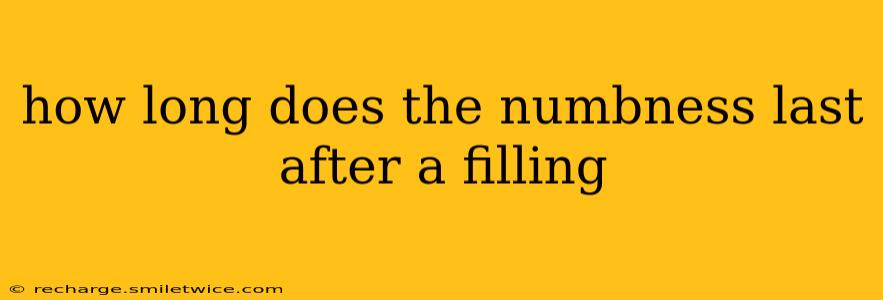How Long Does Numbness Last After a Filling?
Getting a dental filling is a common procedure, but the temporary numbness afterward can be a source of concern for many patients. The duration of this numbness varies greatly depending on several factors, and understanding what to expect can ease anxiety and help manage the post-procedure experience.
What Causes the Numbness?
Before we delve into the duration, let's understand the cause. During a filling procedure, your dentist will likely administer a local anesthetic, typically lidocaine, to numb the area. This anesthetic temporarily blocks nerve signals, preventing you from feeling pain during the procedure. The numbness is a direct result of this anesthetic's effect on your nerves.
How Long Does the Numbness Typically Last?
The most common timeframe for numbness to wear off after a dental filling is between 1 and 4 hours. However, this is just an average. Several factors can influence how long the numbness persists:
- Type and amount of anesthetic: The type of anesthetic used and the amount injected will significantly impact the duration of numbness. Some anesthetics have longer-lasting effects than others.
- Individual metabolism: How quickly your body processes the anesthetic plays a role. Faster metabolisms generally lead to shorter periods of numbness.
- Size and location of the filling: Larger fillings or those in areas with a denser nerve supply might result in longer-lasting numbness.
- Patient health: Underlying health conditions can sometimes affect how your body responds to anesthesia.
What if the Numbness Lasts Longer Than Expected?
While most people experience complete resolution of numbness within 4 hours, it's not uncommon for some residual numbness to linger for a few more hours. However, if the numbness persists for significantly longer than 24 hours, or if you experience any other unusual symptoms like swelling, increased pain, or difficulty swallowing, you should contact your dentist immediately. This could indicate a problem that requires attention.
Can I Speed Up the Recovery Process?
There’s no guaranteed way to speed up the process, but maintaining good oral hygiene and avoiding chewing or biting in the affected area during the numb period can help prevent accidental injury. Gently biting on a gauze pad, as instructed by your dentist, can also help in controlling any minor bleeding.
What Should I Avoid While Numb?
The crucial thing to remember during the period of numbness is safety. You won’t be able to feel pain, so you’re at risk of biting your cheek, lip, or tongue. Avoid hot foods and drinks as well since you won’t be able to sense temperature changes. Stick to soft foods and drink cool liquids until the feeling returns to normal.
Is it Normal to Experience Some Tingling After the Numbness Wears Off?
Yes, some tingling or slight discomfort is often experienced as the numbness subsides. This is a normal part of the recovery process and should resolve itself within a day or two. If the discomfort is significant or persistent, contact your dentist.
Why is My Tongue Numb After a Filling?
Numbness in the tongue is possible, particularly if the filling is located on the lower jaw near the lingual nerve. The duration is typically similar to other areas affected by the anesthetic. As always, consult your dentist if concerns arise.
By understanding the factors affecting the duration of numbness and knowing when to seek professional attention, you can approach your dental filling procedure with greater peace of mind. Remember, your dentist is your best resource for any questions or concerns you may have.
